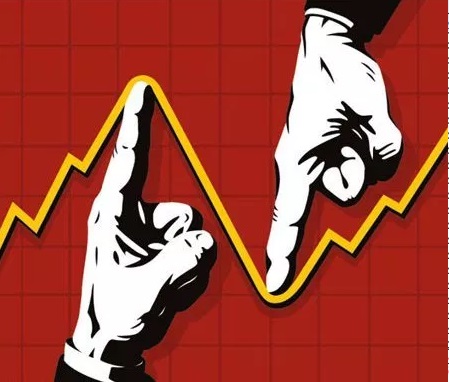The goal of this post is to help demystify the world of investing and provide information that will actually be useful to you. Lets address the most common myths of investing surrounding the stock market and why they are not to be believed.
INVESTING MYTH #1
INVESTING IN STOCKS IS JUST LIKE GAMBLING

This reason alone causes many people to shy away from investing in the stock market. Often times, people will confuse the two words of investing and gambling to mean the same thing. To make an investment means, to use money to purchase something offering profitable returns, especially interest, dividends, or income. Gambling means, to play a game of chance for wagering stakes, by using money or anything of value, to bet on its outcome.
To understand why investing in stocks is inherently different from gambling, it’s important to know what it means to buy stocks. To buy a share of a common stock is to take ownership in a company. It entitles the owner of the stock to a share of the assets as well as a fraction of the profits that the company generates. Investors often, mistakenly think of shares as simply a trading vehicle, and they forget that the stock represents their ownership in a company.
By purchasing a share of a company’s stock you not only own a share of the company, but if the company is profitable they can issue dividends which are directly paid to it’s share holders. Alternatively, if the price of the stock goes up, you can sell it for a profit. Many view the stock market as something unpredictable which fluctuates up and down like a yo-yo, but in general its trend is always moving up.

Since, the outlook for business conditions is always changing, so too are the future earnings of a company. Stock prices fluctuate because a company’s earnings also fluctuate year to year. All of this is okay since investing is done with the goal of it being for the long-term. Investors know that good companies will continue to do well and generate returns for their shareholders even if they occasionally have a bad year. This yo-yo effect becomes less of a concern as a company’s long-term growth continues to move in a forward and positive direction.
In the short-term, a company can survive without profits because of the expectations of future earnings, but no company can fool investors forever. Eventually, a company’s stock price can be expected to show their true value to its shareholders. If they are positive and consistent, then a company’s stock price will reflect this data and investors will profit from their investment.

Gambling, on the other hand, is a zero-sum game. What I mean to say, is that the goal of placing a bet or wager is to merely win money by taking it from a loser and giving it to a winner. No value is ever created. When a person chooses to gamble they have to place short-term bets hoping to win a lot of money quickly. And here-in lies the problem.
At best, a person who gambles may earn some money immediately but no matter how much they win, they will not be able to continually generate income in the future from the same bets. They will need to constantly place new bets hoping that they pay off. However, people forget that when gambling, the true winner is the house because they control the stakes and payouts. As any experienced gambler will tell you, no matter who you are, the longer you keep betting, the house will always win.
By investing your money in the stock market, you help to increase the overall wealth of an economy creating more jobs for others. This allows companies to become more innovative and competitive increasing their production of better products and goods. All of which translates into an increase in their value and profits which benefit their shareholders. This is how investing is different from gambling. Investing creates long-term wealth generation, where as, gambling creates short-term gains if you win, and after the house takes its share first. Don’t confuse investing and creating wealth with gambling’s zero-sum game.
INVESTING MYTH #2
THE STOCK MARKET IS AN EXCLUSIVE CLUB FOR BROKERS AND RICH PEOPLE

This is absolutely untrue. Any person, regardless of their financial background can invest in the stock market. What many people forget, is that, everyone had to start investing in order to become rich, even if it was only with one dollar. The purpose of the stock market is to be a place where anyone can buy or sell stocks. Not a place only rich brokers and investors work like those depicted in movies or television.
As Robert Kiyosaki says, “My rich dad also thought that the Hollywood version of investing was financial silliness. ‘Many people think investing is this exciting process where there is a lot of drama,’ he said. ‘Many people think it involves a lot of risk, luck, timing, and hot tips. But to me investing is a plan—an often dull, boring, and almost mechanical process of getting rich.’ For rich dad, the dull, boring, and almost mechanical process of getting rich was his formula based on his favorite game, Monopoly, a game he taught his son and me when we were kids.
Robert Kiyosaki – Author Of Rich Dad Poor Dad
That formula was simple: Buy four green houses. Exchange four green houses for a red hotel. At the time he was teaching us this formula, rich dad didn’t have his red hotel in real life. But by following his plan, he had a number of them within ten years.
Rich dad was adamant that this was not a difficult or complex process. He simply invested in a good deal and then “traded up” those investments when able. ‘One day,’ he said, ‘I woke up and realized I was rich.’
The question is, if investing is a matter of simply following a formula, then how come most people don’t follow the same formula? The reality is that most people do not want to follow boring formulas. They get dull. Most people start following a plan and then they get bored. The result of this is often a loss of money or breaking even. With the exciting and wild swings come fluctuations in money but never the slow, steady, measured growth a true investor looks for. ‘Most people think there is some magic to getting rich through investing,’ rich dad said. ‘Or they think that if it is not complicated, it cannot be a good plan. Trust me. When it comes to investing, simple is better than complex.’”
Just because many brokers or market advisors claim to be able to know the markets’ every turn, the fact is that, almost every study done on this topic has proven these claims are false. Most brokers are notoriously inaccurate and can be misleading. Years before, they were the only ones to have all of this information at their finger tips. Its meanings were clouded in mystery and difficult to interpret even if a non-professional brokers could get their hands on the same information. However, within the last few decades the internet has made the market much more open to the public than ever before. All the data and research tools previously available only to the brokerage firms are now there and easy to access for individuals to use as well.
INVESTING MYTH #3
FALLEN ANGELS WILL GO BACK UP, EVENTUALLY
What do I mean by this? Well, often times amateur investors will think that a stock trading near its 52-week low is a good buy. Whatever the reason for this myth’s appeal, nothing is more destructive then to think this way. There is a Wall Street proverb that says, “Those who try to catch a falling knife only get hurt.” Meaning, when a stock is falling in price, don’t try to guess where it will bottom out. This can lead to costly mistakes causing you to loose money.
For example, suppose you are looking at two stocks:
- Starbucks (SBUX) had an all-time high last year with it’s stock price ending around $50, but has since fallen to $10 per share.
- Wells Fargo (WFC) has recently gone from $5 to $10 per share.
Which stock would you buy? Believe it or not, all things being equal, a majority of investors will choose SBUX, because they believe that it will eventually make it back up to $50 or similar levels again.

Thinking this way is the worst idea in investing! Price is only one part of the investing equation but value is the other larger part. The goal for any investor is to buy good companies at reasonable prices. Buying companies solely because their market price has fallen will either get you nowhere or in a negative cash situation. This reminds me of a famous quote by Warren Buffett, who said, “Price is what you Pay, Value is what you Get.” We’ll talk more about him later but the point is, to always buy a good company at a reasonable price.
INVESTING MYTH #4
STOCKS THAT GO UP MUST COME DOWN

The laws of physics do not apply to the stock market and if an investor believes this they can make serious errors in their investing strategies. Unlike the physical world we live in, there’s no gravitational force to pull stocks back to an even or ground level. The stock market is always moving forward and upward even during those years when there are corrections or losses.
For example, in 1980, Warren Buffett’s company Berkshire Hathaway’s (BRK-A) stock price was at $167 per share which was a bit step but fair since it’s considered a good company. Then, between 1990 and 1994, the price went from $7,455 to $17,250 per share. In 1998, it climbed to $78,305, in 2004 to $94,500, and in 2007 it moved to $141,600 per share. Had you thought that this stock was going to return to its lower initial position, you would have missed out on the subsequent rise to its current price of $215,824 per share over the years.
Of course it’s great to see a company’s highs but what about when there are market corrections in which the stock drops in price? Sure, this happens at various times during a company’s life span but a good company always recovers and gains in price just like the stock market overall. Berkshire Hathaway is no different. In 2000, and 2008, it’s price decreased by several thousand dollars but it always returned stronger and higher then before. The point, is that the stock price is a reflection of the company. If you find its run by excellent managers, then there is no reason the stock won’t keep on going up. This graph shows the company’s performance over the past 45 years.
INVESTING MYTH #5
A LITTLE KNOWLEDGE IS BETTER THAN NONE
Normally, this can of course be true in people’s daily lives as a little knowledge may be all you need in order to do something. However, it is not true when investing. It’s crucial in the stock market that an investor have a clear understanding of what they are doing with their money. Those investors who do their homework and put in the work are the ones that succeed.
Not everyone has the time or energy to research and learn how the market works, so they will seek a good financial advisor to help them decide what to do with their money. This may come from a company, a seminar, even a book, but the important thing is that they are learning why they’re investing their money and how it works. The cost of investing in something that they do not fully understand far outweighs the cost of speaking with an investment advisor.
Just like the old Wall Street saying goes, “What’s obvious is obviously wrong.” This means that knowing a little bit will only have you following the crowd making choices you don’t understand which could lead to costly mistakes. Successful investing takes a little hard work and effort but is definitely manageable for even those with busy and hectic lives. Another way to think of it, is imagine that a partially informed investor is like a partially informed surgeon. The mistakes they could make, could be severe, and cause injuries to their financial health.
DISCLOSURE
The above article is for educational purposes only. Under no circumstances does any information provided in the article represent a recommendation to buy, sell or hold any stocks/asset. In no event shall ViA or any Author be liable to any viewers, guests or third party for any damages of any kind arising out of the use of any content shared here including, without limitation, use of such content outside of its intended purpose of investor education, and any investment losses, lost profits, lost opportunity, special, incidental, indirect, consequential or punitive damages resulting from such unintended use.














